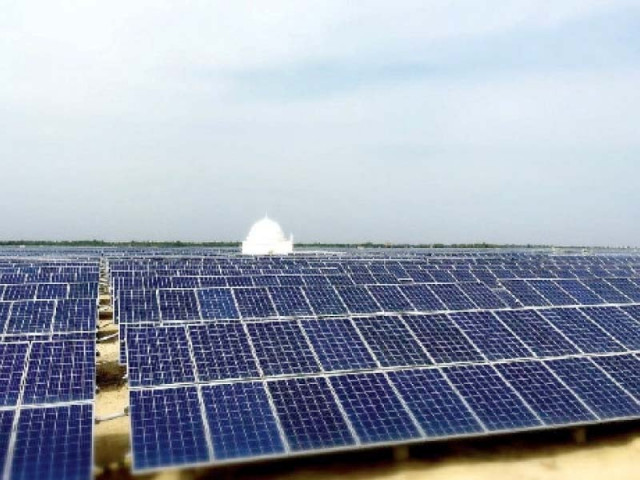Solar grids bring relief to Sindh
19-kilowatt mini-grids powered by solar energy installed in Ishaq Jokoi

Indus Earth Trust (IET), an organisation promoting green energy, has provided a life-changing solution for residents of Ishaq Jokio, a small settlement in the Sindh province of Pakistan.
The 19-kilowatt mini-grids powered by solar energy have transformed the lives of people, who have been accustomed to enduring long hours of power cuts during peak consumption in summer.
“Villages were selected according to a needs assessment survey, while the villagers provided the land where the 19-kilowatt mini-grids were installed. In this hamlet caressed by the sea breeze from the Arabian Sea, panels bred prosperity,” reported the China Economic Net.
According to the State of Industry reports from the National Electric Power Regulatory Authority (NEPRA), homes consume 50% of the total electricity delivered, and this demand is largely driven by cooling and lighting. The demand is estimated to increase from 106 terawatt-hour (TWh) in 2020 to 234 TWh in 2030, representing a 121% increase due to the rise in temperatures from climate change.
Pakistan’s energy problems have been exacerbated manifold by the Russia-Ukraine conflict and the global supply crisis. Pakistan’s fuel import bill surged to $23 billion in FY2021-22, a 105% increase from the previous financial year. The country’s per capita annual electricity consumption of 644 kilowatt-hour (kWh) is among the lowest in the world, which is only 18% of the world average, 7% of the developed countries’ average.
However, Pakistan’s efforts to embrace photovoltaics at all levels have started to pay off. Pakistan imported about $1.2 billion in photovoltaic modules in the last fiscal year, and in 2022, China’s photovoltaic module exports to Pakistan reached approximately $870 million, with a total installed capacity of 3.2GW, a year-on-year increase of 54% and 37%, respectively, said Liu Yiyang, Deputy Secretary-General and Press Spokesperson of China Photovoltaic Industry Association (CPIA). The Pakistan Solar Association (PSA) forecasted that the country’s import demand for photovoltaic products this year will be around $1.8 billion.
“Pakistan’s Solar Energy Market is expected to record a CAGR of 2.5% during the period from 2022 to 2027, with Net Metering-Based Solar Installations and Power Generation growing by 102% and 108% respectively,” said a KTrade Securities analyst.
A World Bank study in 2020 urged Pakistan to urgently expand solar and wind “to at least 30% of electricity generation capacity by 2030, equivalent to around 24,000 MW.” This provides huge opportunities for growth as currently, as of December 2022, Pakistan’s total domestic installed power capacity is 43,775 MW, of which photovoltaic installed capacity is 630 MW, accounting for about 1.4% only.
China’s efforts are also reaching millions of households in remote areas in the form of micro-power plants. Out of the $144 million foreign investment in PV plants in Pakistan, $125 million is from China, accounting for nearly 87% of the total.
“Pakistan and China are a perfect match for collaboration on renewable energy (solar PV) as China is a globally known giant when it comes to renewable energy technology, while Pakistan needs to move away from thermal to renewable for power generation,” stated a KTrade Securities solar PV industry report.
Recently, the Pakistan Solar Association (PSA) sent an official letter adjuring the federal government to ask SBP and other commercial banks to help in the solar imports through an annual limit of USD 800 million at a time when Pakistan is facing a renewable energy sector that is growing rapidly. The letter also urged the government to take steps to promote local manufacturing of solar panels to reduce reliance on imports and create job opportunities for the local population.
The success of the Indus Earth Trust project in Ishaq Jokio serves as a testament to the potential of renewable energy in Pakistan. With the increasing demand for electricity and the urgent need to address the impacts of climate change, the adoption of renewable energy sources such as solar and wind power is becoming more critical than ever.
By embracing green energy, Pakistan can not only meet its energy demands sustainably but also reduce its dependence on fossil fuels, mitigate the impacts of climate change, and create new job opportunities. The journey towards a greener future may be challenging, but with organisations like the Indus Earth Trust and the support of the government and the private sector, Pakistan is on the path to a brighter and more sustainable future.
THE ARTICLE ORIGINALLY APPEARED ON THE CHINA ECONOMIC NET
Published in The Express Tribune, April 13th, 2023.
Like Business on Facebook, follow @TribuneBiz on Twitter to stay informed and join in the conversation.



















COMMENTS
Comments are moderated and generally will be posted if they are on-topic and not abusive.
For more information, please see our Comments FAQ